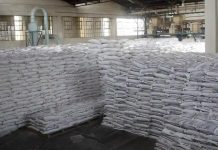The Grain Millers Association of Zimbabwe (GMAZ) has received 300 000 tonnes of wheat imported recently from Europe after engaging a new wheat supplier and funding partner, Goldstone International.
GMAZ chairperson, Tafadzwa Musarara told journalists while unveiling the first 5 000 tonne consignment at Blue Ribbon Depot on Friday that the bread shortages experienced in the past few months will now be a thing of the past.
Musarara said millers were geared up to meet the festive season demand.
The GMAZ chief said the remaining tonnes are still in Beira, Mozambique and will be distributed to millers soon.
“The wheat situation is a matter of public interest and we have had some intermittent supply of bread in the market and I’m glad to announce that the bread situation has improved in the past three weeks,” said Musarara.
“The milling industry is now geared for the festive season where demand for bread and confectioneries is high. We want to thank the government for their efforts in normalising wheat supply.
“The Reserve Bank of Zimbabwe and Goldstone International has put in place an arrangement for us to have continuous supply of wheat,” he said.
Musarara said the wheat consignment had spent a long time in Beira until the central bank assisted in bringing it home.
The GMAZ chairperson said Zimbabwe needs about 110 000 tonnes of wheat to complete this year.
He said he was confident there will be food security in the country particularly continuous availability of bread.
He however expressed concern regarding load shedding saying it was bringing about a bad impact on their industry.
Musarara said millers have already approached Energy Minister, Fortune Chasi to try and persuade his ministry to exempt them from excessive load shedding.
“The plans we now have are solid and we are confident that there will be food security in the country from now up to the end of the festive season.
“The biggest challenge we are however facing just like any industry is the unavailability of electricity. Blue Ribbon is the second biggest miller in the country, yet it is the most hit by load shedding.
“As much as wheat is coming in, we are working with the Energy Minister and we have made our formal request that we be exempted from load shedding,” said Musarara.
Zimbabwe requires about 460 000 tonnes of wheat annually.
The national wheat requirement is 38 000 tonnes a month and the current national consumption stands at 1,5 million loaves a day.






